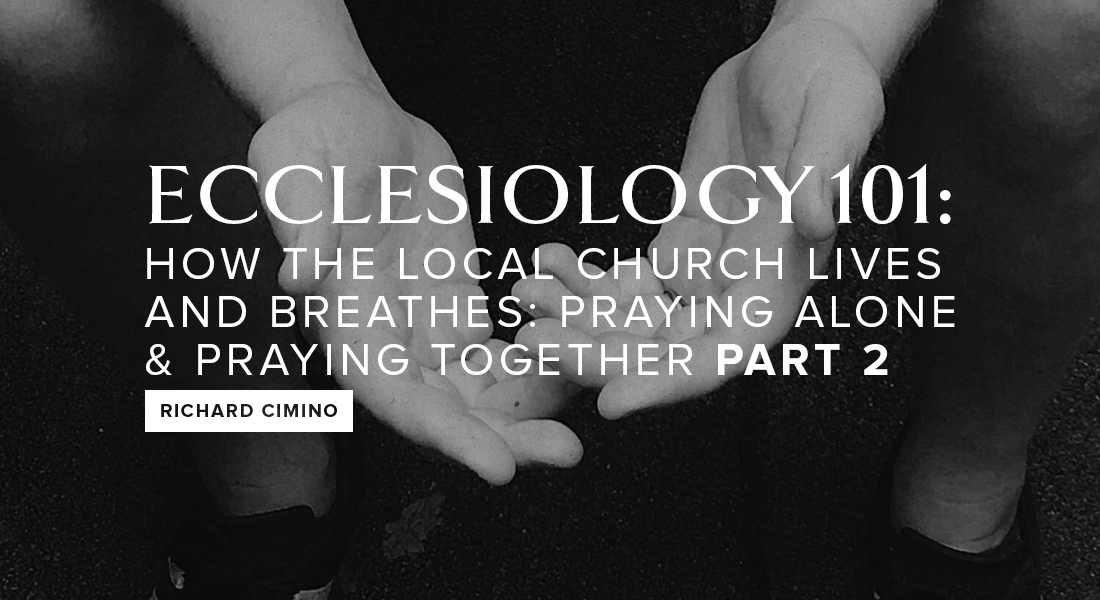
In our last installment of Ecclesiology 101, we began to look at how the local church lives and breathes in relationship to prayer.
We laid the foundation by noting that prayer in its essence is man talking with God. It is using words to express to God what we sense and feel. It is using words to express our needs to God. It’s the use of words in responding to who God is, what God is doing or what God has done.
If that is what prayer is, then the book of Psalms is God’s textbook on prayer. Though the psalms have much to say about God — each author prays (talks to God) in response to what they know about God. That is the prerequisite of prayer. What we know about God is the soil in which prayer grows.
The prayers of David are a great example of this.
“Psalm 3 A Psalm of David, when he fled from Absalom his son.
O Lord, how many are my foes! Many are rising against me; many are saying of my soul, “There is no salvation for him in God.” Selah But you, O Lord, are a shield about me, my glory, and the lifter of my head. I lay down and slept; I woke again, for the Lord sustained me. I will not be afraid of many thousands of people who have set themselves against me all around. Arise, O Lord! Save me, O my God! For you strike all my enemies on the cheek; you break the teeth of the wicked. Salvation belongs to the Lord; your blessing be on your people!” (Psalm 3:1-8).
“Psalm 34 Of David, when he changed his behavior before Abimelech, so that he drove him out, and he went away.
I will bless the Lord at all times; his praise shall continually be in my mouth. My soul makes its boast in the Lord; let the humble hear and be glad. Oh, magnify the Lord with me, and let us exalt his name together! I sought the Lord, and he answered me and delivered me from all my fears. Those who look to him are radiant, and their faces shall never be ashamed. This poor man cried, and the Lord heard him and saved him out of all his troubles. The angel of the Lord encamps around those who fear him, and delivers them. Oh, taste and see that the Lord is good! Blessed is the man who takes refuge in him! (Psalm 34:1-8).
“Psalm 51 A Psalm of David, when Nathan the prophet went to him, after he had gone in to Bathsheba.”
They held back nothing from their intense, personal, in the moment prayers. They even made sure to write down the wrong attitudes and flawed passions that they spoke openly to God for us to see.
We ended by noting that what they PRAYED ALONE was also intended to be PRAYED TOGETHER.
David clearly intended Psalm 3 to be read and prayed in community:
“I cried aloud to the Lord, and he answered me from his holy hill. Selah Salvation belongs to the Lord; your blessing be on your people! Selah” (Psalm 3:4).
David intended Psalm 34 to be prayed in community:
“Oh, fear the Lord, you his saints, for those who fear him have no lack! Come, O children, listen to me; I will teach you the fear of the Lord. What man is there who desires life and loves many days, that he may see good?” (Psalm 34:9-12).
David intended that radical, intensely personal and brutally honest prayer of Psalm 51 to be sung in community. The full title of Psalm 51 is “To the choirmaster. A Psalm of David, when Nathan the prophet went to him, after he had gone in to Bathsheba.”
The book of Psalms became the prayer book of Israel. These prayers were prayed collectively when they gathered in the synagogue. They prayed these psalms as a community — knowing the needs of individuals in the synagogue — knowing who those prayers hit home with and knowing how those prayers resonated with the heart and spiritual state of the community as a whole.
Many of these prayers were put to music so they could be committed to memory. The Book of Psalms was the prayer book of Jesus — the Song Book of Jesus.
This “gathered” form of prayer continued in the newborn church.
“And they devoted themselves to the apostles’ teaching and the fellowship, to the breaking of bread and the prayers” (Acts 2:42).
“Now Peter and John were going up to the temple at the hour of prayer, the ninth hour” (Acts 3:1).
Peter and John were on their way to seek God in prayer with other believers. They did this together on a regular basis — at a regular time.
AGAIN — For a community of believers to live and breathe in connection with prayer presumes the individuals that comprise that community pray.
Prayer is an incredibly personal and privileged vertical conversation between an individual child of God and his or her heavenly Father. Prayer does have a necessary private context. Jesus modeled this in His own prayer life. He would get up before it was light and find a deserted place to be alone in prayer with His Father. He would come forth from those times of prayer with marching orders (“No, I can’t stay and preach to the crowds in Capernaum; I have to go to the unwalled towns and villages” — He chose the 12 after spending the night alone with His Father in prayer.)
Jesus taught about praying privately.
In Matthew 6:6, He taught about going into your own room and shutting the door behind you to pray. But the main point was not to encourage isolated prayer. That instruction was a warning against the temptation to pray publicly for the wrong reasons.
YES — prayer often begins when we’re alone. We pray our guilt, our pain, our joy. We pray on our bed at night (as the psalmist did). We even pray privately when surrounded by unbelievers in our neighborhood, or at work, or in the classroom. But we can never be with others non-stop. And by the way — we should never be with others non-stop. But we should always be aware of the fact that we are always with God.
God wants His children to have personal conversations with Him. Sometimes He demands them, right? But He also wants to have family conversations with His children. He wants us to call our friends into prayer. He knows that our prayers and our prayer life mature when they are integrated with the community of believers God has placed us in.
I really like how Eugene Peterson puts it: “By ourselves, we are not ourselves.” There is a very real way in which we are not fully ourselves until we are a part of a community of believers.
There is something extraordinary that happens when we pray with others who have prayed. There is something amazing when we put our knees on the ground together with others — we have the sense that we are on the same ground — our knees are level with their knees. By the way, It’s okay to get on our knees when we worship and pray together. I become more fully me when my hands are raised with your hands in praise and adoration, when my voice joins with your voices in praise and prayer, rejoicing or weeping. The point of worshiping and praying with all of you is not to express myself — but to become the person God saved me to be. By myself, I’m not really myself. By myself, I am not really myself — I am not the man Jesus redeemed me to be!
We are NOT naturally good at this.
It goes against the individualism of culture. It goes against the grain of how we are so very self-conscious about what others think or feel about us. It goes against the grain of how we would rather not be known. We would not have the psalms if that were the case. The psalms were self-disclosing! Those prayers made known the deepest needs, greatest failures and personal fears of the writer to the community of God’s people.
And as they were prayed in community, people owned those same needs, those same failures and those same fears as their own. As individuals, we are wonderfully and beyond comprehension of the objects of God’s grace and love. But when we pray in community — grace and love suddenly have objects outside of ourselves. And as we pray with others — praying about our needs and failures and fears — we also become the object of God’s grace and love through His other children.
We do pray in song today. Sometimes we sing the lyrics of the psalms.
When we sing the psalms, are we singing them as OURS?
DO we sing the words as OUR prayers? Are we self-disclosing? When we do, we experience community! When we do, we actually become more of who Jesus saved us to be.
This is why I struggle so much with so much of what is called worship today. It is more about musicality — more about performance — more about vibe and production than praying together.
“We call our worship ‘dynamic’ or ‘exciting’ or ‘engaging.’ The unintended message is that worship is not for God — but really for the worshiper. Which raises the question – who are we worshiping?” –Jared C. Wilson, Prodigal Church
“Between 1995 and 2000 I’d traveled to a host of worship-driven churches — On the good occasions, the worship experience was transporting… Too many times, I came away with an unnamed, uneasy feeling. Something was not quite right. The worship felt disconnected from real life. Then there were the services when the pathology… came right over the platform and hit me in the face. It was unabashed self-absorption, a worship culture that screamed, ‘It’s all about us…'”– Sally Morgenthaler
If prayer is an integral part of how the local church lives and breathes, how do we get past our natural inclination toward individualism and self-consciousness?
I believe it’s crucial to remember why we find ourselves in a specific gathering of believers.
God saved you — quarried you out to be a building block — a living stone built on the foundation of Jesus — related to the cornerstone and fitted alongside other living stones. All that you are in Jesus, all that He is desiring to do in and through you is inextricably tied to the fact that He places us next to a very specific collection of other living stones.
You will never be the living stone Jesus saved you to be until you do life with the other living stones around you — and a huge part of that life means that you move from PRAYING ALONE to PRAYING TOGETHER with and for these other living stones.









